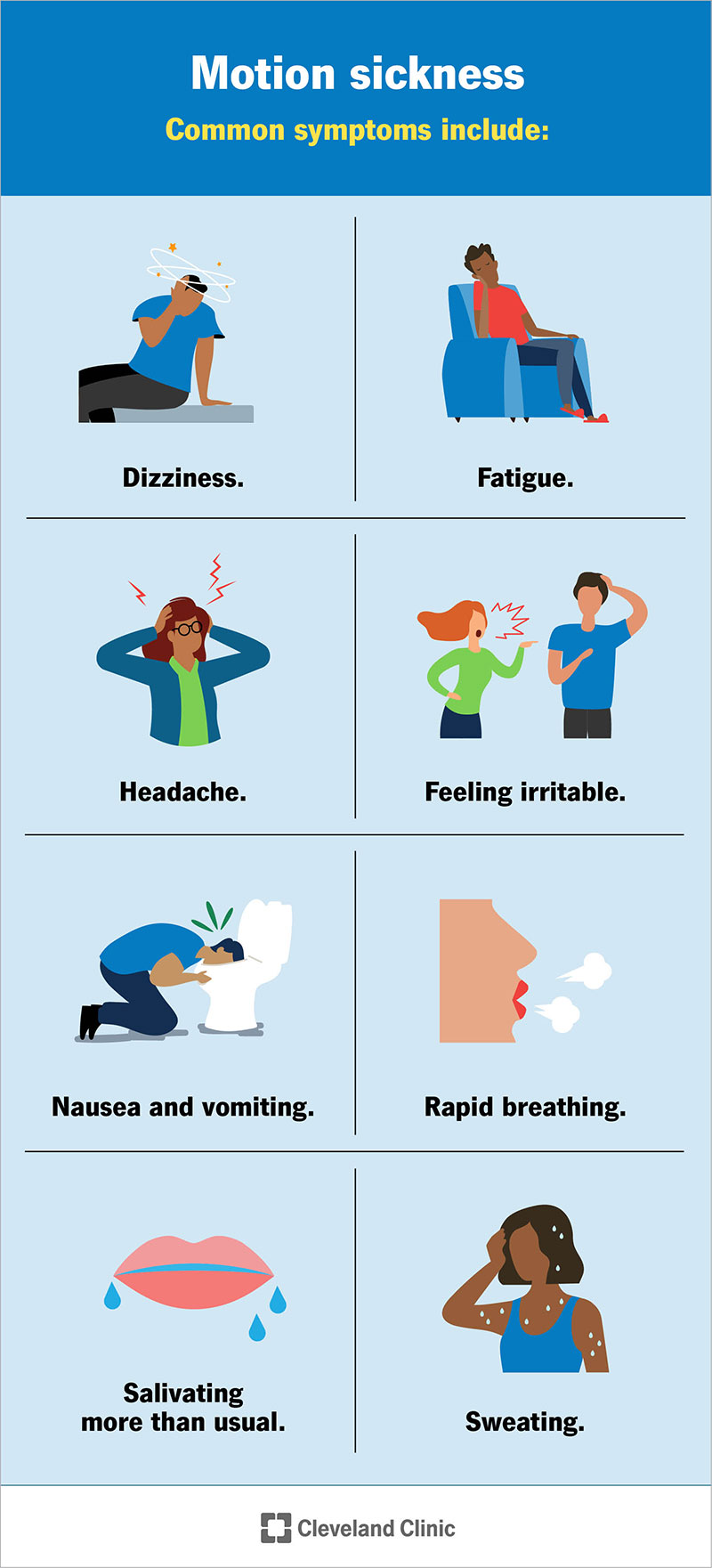Motion sickness is a common condition that happens when you’re in motion, like riding in a vehicle, while sitting still. It happens when your eyes, inner ear and body send conflicting messages to your brain. Symptoms include nausea, breaking out in cold sweat or headache. Fortunately, there are ways to prevent motion sickness or ease its symptoms.
Advertisement
Cleveland Clinic is a non-profit academic medical center. Advertising on our site helps support our mission. We do not endorse non-Cleveland Clinic products or services. Policy
Motion sickness is a condition that happens when your eyes, inner ear and body send conflicting messages to your brain. You can develop the condition whenever your body is staying still but you’re being moved by a vehicle, like when you’re riding in a car or standing on a boat deck.
Advertisement
Cleveland Clinic is a non-profit academic medical center. Advertising on our site helps support our mission. We do not endorse non-Cleveland Clinic products or services. Policy
Some people get a kind of motion sickness while playing video games and virtual reality games (virtual motion sickness or VMS). Symptoms include nausea, breaking out in cold sweat or headache. Fortunately, there are ways to prevent motion sickness or ease its symptoms.

Image content: This image is available to view online.
View image online (https://my.clevelandclinic.org/-/scassets/images/org/health/articles/12782-motion-sickness)
Motion sickness symptoms can develop slowly or appear all at once. Common symptoms include:
Motion sickness happens when your brain gets conflicting messages from the parts of your body that sense motion: your eyes, inner ear, muscles and joints. Here’s an example of how that happens when you’re riding in a vehicle:
Advertisement
You can have motion sickness anytime there’s confusion between your senses and your brain:
The condition is more likely to affect children ages 2 to 12 than adults. Other risk factors are:
In general, motion sickness doesn’t cause serious health issues. In some cases, however, people continue to feel nauseous and vomit even though they’re not doing things like riding in vehicles. Excessive vomiting can cause dehydration and low blood pressure (hypotension).
There aren’t specific tests to diagnose motion sickness. A healthcare provider may do a physical examination and check your ears. They’ll ask about your symptoms and when they started.
You may not be able to make motion sickness symptoms go away, but the following tips may help you feel better:
If you’re like most people, your motion sickness symptoms go away once you’re off the plane or boat or out of the car.
You may not be able to avoid motion sickness, but a little planning goes a long way toward reducing the chance that you’ll have severe symptoms.
For example, find a seat that lets you face forward while you’re in transit. No matter how you’re traveling, where you sit may help. Below are seating suggestions for most types of travel:
There are over-the-counter medications that may prevent motion sickness symptoms:
Advertisement
Probably not. You can still feel nauseated even when there’s not much in your belly. It may help to take the following steps before you take off on your journey:
Motion sickness isn’t a serious medical issue. But talk to a healthcare provider if you have:
Motion sickness can make travel a miserable experience and take the fun out of playing a video game or an immersive virtual reality game. Fortunately, there are things you can do to prevent it or ease its symptoms. If you’re prone to motion sickness, talk to your healthcare provider about ways to prevent getting sick and what to do if you get sick.
Advertisement

Sign up for our Health Essentials emails for expert guidance on nutrition, fitness, sleep, skin care and more.
Learn more about the Health Library and our editorial process.
Cleveland Clinic’s health articles are based on evidence-backed information and review by medical professionals to ensure accuracy, reliability and up-to-date clinical standards.
Cleveland Clinic’s health articles are based on evidence-backed information and review by medical professionals to ensure accuracy, reliability and up-to-date clinical standards.
Cleveland Clinic’s primary care providers offer lifelong medical care. From sinus infections and high blood pressure to preventive screening, we’re here for you.
